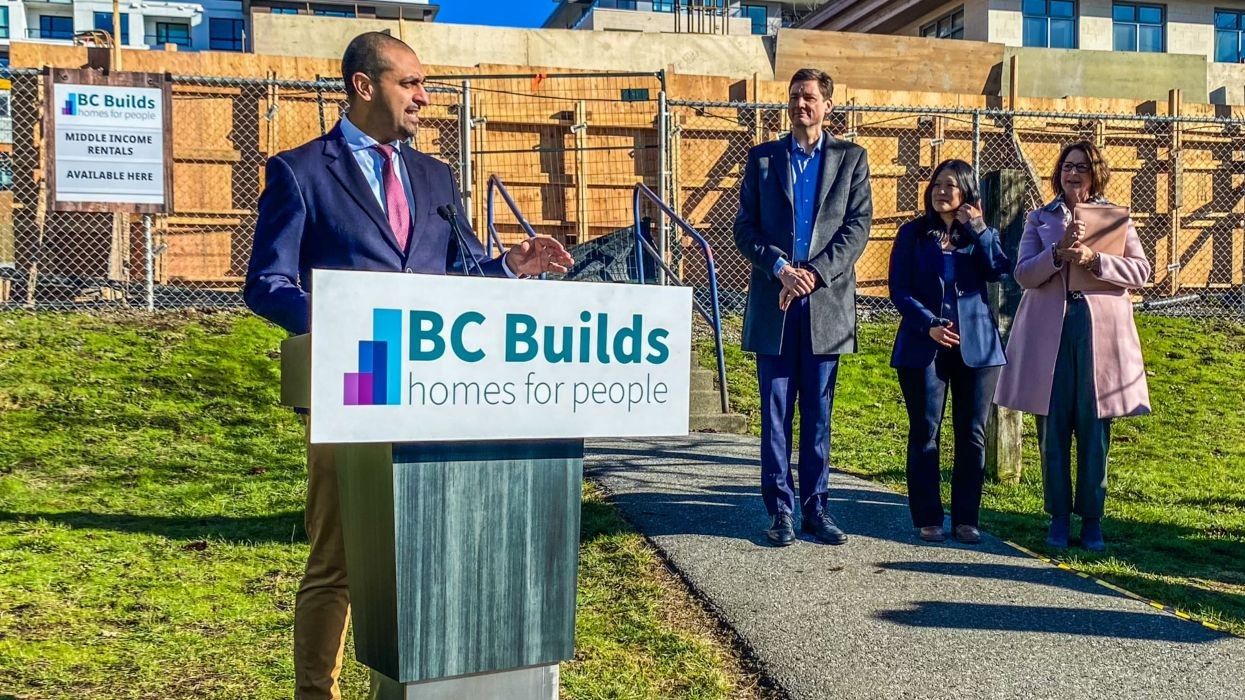On Tuesday, the Province of British Columbia formally announced details about BC Builds, a new initiative that will "lower construction costs, speed up timelines, and deliver more homes that middle-income people who live and work in BC can afford."
As the the Province notes, affordable homes continue to be in short supply as a result of factors such as inflation, high interest rates, increased construction costs, and high costs of land, and many households are now spending as much as half of their income on housing — a problem that even extends to middle-income earners.
The BC Builds program seeks to alleviate some of those issues by acting as a "land bank" and providing lower-cost financing to get homes built faster.
The Province says BC Builds will partner with local governments, First Nations, non-profits, and the development industry to identify underutilized land, which will be pre-zoned for residential development.
It will then facilitate partnership agreements and lease terms between landowners, builders, and operators, with a focus on rental housing offered at rates that reflect local conditions and are affordable to middle-income earners, with a set target where middle-income earners will have to spend no more than 30% of their income on rent. The Province says rents in all units will not exceed market rent for their respective communities and many will be below.
At least 20% of all homes built through BC Builds in partnership with non-profits and First Nations will also have rents that are at least 20% below market rates.
After a partnership is established — landowners will be able to find development partners through the upcoming BC Builds website, or on their own — BC Builds will then work with the relevant governments to accelerate the approval process.
BC Builds will then offer low-interest construction financing in order to reduce the costs of construction and help projects move to construction faster, hopefully within 12 to 18 months, rather than the current average of three to five years, the Province says. Pre-development loans will also be available.
BC Builds will offer grants to non-profits and First Nations, with a maximum grant of $225,000 per unit. In total, BC Builds will provide $2B in low-cost financing and commit $950M in grants, the Province said.
On Tuesday, the Province also announced that 20 initial sites have been identified on underutilized land owned by governments, First Nations, and non-profits, and that BC Builds is now seeking partners to develop those sites.
Three initial projects are already underway, including an 18-storey mass timber build developed by non-profit Catalyst to be located at 225 East Second Street in North Vancouver, a four-to-six-storey building developed by Khowutzun Development LLP to be located at 222 Cowichan Way in Duncan, and a four-storey building developed by non-profit New Commons to be located at 571 Shaw Road in Gibsons. The three sites are owned by, respectively, the City of North Vancouver, the Cowichan Tribes, and the Town of Gibsons, and will deliver around 450 affordable homes.
Additionally, the Province says BC Builds is "designed to grow," with thousands of homes expected to be approved and expedited over the next three years, with some perhaps even beginning construction as early as summer 2024.
"Anyone looking for a place to live knows how hard it is – even if you make a decent salary there are not enough rental homes people can afford," said Premier Eby. "The private sector alone has not been able to deliver the homes middle-class people in BC need. That's why we're taking action through BC Builds to deliver lower-cost middle-income homes, faster, so the people who keep our communities working – like teachers, nurses, and construction workers – can find homes they can afford in the communities they love."
"Too many middle-class families are struggling to find a place to live that they can afford, and that's holding people and our economy back," added Minister of Housing Ravi Kahlon. "BC Builds is designed to meet this moment, overcome challenging market conditions, and deliver lower-cost rental homes for the people who deliver the services we rely on, and drive our economy forward – so they can build good lives here and thrive."
- Interview: Ravi Kahlon On His First Year As BC's Minister Of Housing ›
- Rental Protection Fund Eyeing 25 Properties Across BC For Acquisition ›
- CEO Katie Maslechko On The Launch Of BC's Rental Protection Fund ›
- BC United Releases Housing Platform Ahead Of 2024 Election ›
- BC Builds: Province Now Accepting Proposals For First 8 Development Sites ›
- Follow The Money (And Projects): BC Builds ›





















